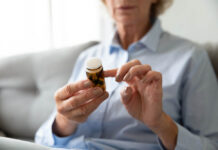In a new article in JAMA Psychiatry, researchers review the evidence for cannabis in the treatment of pain or post-traumatic stress disorder (PTSD). Their findings: it’s a pipe dream. Instead, they write, studies show that the placebo effect is responsible for any improvement.
The article was written by Aaron S. Wolfgang at Yale University Medical School and Charles W. Hoge at Walter Reed National Military Medical Center. It focused primarily on members of the military and veterans.
“The current body of evidence does not support the use of cannabis or cannabinoids for the treatment of pain or PTSD in military personnel or veterans. The favorable outcomes that patients report with these substances for both pain and PTSD currently are better explained by expectancy biases than by a treatment effect,” write Wolfgang and Hoge.
 Wolfgang and Hoge cite two meta-analyses of randomized clinical trials (RCTs) that compared cannabis and cannabinoids to placebo for pain. One study, including 36 RCTs, concluded overall that there was no benefit; some individual studies in that analysis did show a slight benefit over placebo, the authors write, but they were at high risk of bias, and the evidence was considered low-quality. The majority of studies found no benefit.
Wolfgang and Hoge cite two meta-analyses of randomized clinical trials (RCTs) that compared cannabis and cannabinoids to placebo for pain. One study, including 36 RCTs, concluded overall that there was no benefit; some individual studies in that analysis did show a slight benefit over placebo, the authors write, but they were at high risk of bias, and the evidence was considered low-quality. The majority of studies found no benefit.
Another meta-analysis cited by the authors included 20 RCTs and found, again, that the drugs didn’t beat placebo. However, the placebo group experienced a moderate-to-large improvement in pain.
The authors write, “This suggests that patients’ subjective report of improvement in pain while taking a cannabinoid may be attributable to the placebo effect, potentially due to favorable expectations of the cannabinoid’s therapeutic potential rather than to a biological treatment effect.”
What about PTSD? The researchers write that only two RCTs of cannabis/cannabinoids for PTSD have been conducted. One, a tiny study of 10 people, found an effect for the drug—but the drug was a synthetic cannabinoid that has since been discontinued, and the tiny sample size makes it impossible to draw any firm conclusion from this study.
The second RCT was a large study of “smoked cannabis” with four groups: a high CBD group, a high THC group, a moderate THC and CBD group, and a control arm (low THC and CBD). The blind was broken: every single person in the high THC and moderate groups correctly guessed their group allocation, and most people in the other groups guessed correctly as well.
Despite this, there was no difference between groups on PTSD symptoms—all the groups improved quite a lot during the study. Even the group that smoked a “placebo” (low THC and CBD) did extremely well (effect size d = 1.30). Thus, Wolfgang and Hoge write that the placebo effect is likely responsible for the improvement in PTSD symptoms found in this study.
“An effect size of this magnitude in the placebo group is unusual among RCTs examining medications for treating PTSD, which suggests a placebo effect, potentially due to expectancy biases that have also been found in other studies of cannabinoids,” they write.
The researchers add that cannabis use—particularly long-term use, as would be required to treat a chronic condition—is associated with many adverse effects. They cite a study of veterans with subthreshold or full PTSD, which found those who used cannabis were more likely to have depression, anxiety, and suicidal ideation, have decreased cognitive functioning, and use other substances or avoidance to cope with PTSD. Another study found that those who used cannabis were less likely to improve when undergoing actual PTSD treatment, such as with exposure therapy.
In conclusion, write Wolfgang and Hoge, people need to be educated about the fact that cannabis is ineffective for pain and PTSD, failing to beat a placebo for these conditions. Moreover, they add, the drug comes with harmful effects and may even reduce the impact of actual effective PTSD treatment.
“Given the widespread legalization of cannabis, ongoing education of veterans must highlight that these substances lack effectiveness for treating PTSD and pain and have considerable harmful effects, are associated with comorbidities, and affect treatment effectiveness for PTSD.”
****
Wolfgang, A. S. & Hoge, C. W. (2023). Cannabis and cannabinoids for pain and posttraumatic stress disorder in military personnel and veterans. JAMA Psychiatry, 80(9), 869-870. doi:10.1001/jamapsychiatry.2023.1685 (Link)















A lot of people are going to be disappointed by this. Nevertheless a rational drug policy might still decriminalise cannabis.
Report comment
I’m not at all anti-pot, but I am healing from a lifetime of complex-PTSD and know without a doubt that smoking pot had zero curative benefits. If anything, it dumbed me down and also increased social anxiety at times. I believe that other substances currently being studied by MAPS and other groups do have potential for healing trauma, but only when used wisely, in conjunction with good psychotherapy, and along with a lot of hard work.
Report comment
Here in Colorado they recently decriminalized mushrooms (not the same as legalization.). Ketamine administered by a therapist has also become more common.
Report comment
This is a VERY POORLY written report, about a VERY POORLY conducted research….
“Expectancy biases”? WTF? is that the same thing as “placebo effect”, or not?….
In text, the study’s authors admit
“However, the placebo group experienced a moderate-to-large improvement in pain.”
So cannabis DOES WORK?….why do the conclusions suggest otherwise?….
Looks like more pro-PhRMA propqaganda to me….
Report comment
As a stage 4 cancer patient I have gotten some relief from pain with thc/cbd gummies. But it has not helped with mood, nor did I expect it to. I have struggled with depression for 50 years. FYI, I live in Colorado where weed has been legal for over 6 years.
Report comment
I would be very skeptical of any analysis that claims that the use of cannabis for pain should be avoided based on findings on perceptions of pain, since the psychoactive effects of cannabis may aid in the tolerance of pain, independent of analgesia. Any analysis should incorporate measure of both pain perception and tolerance.
Report comment
So just shut up and take your Zoloft instead, right???
Big Pharma loves uuuuuu, and big pharma knows best!
Don’t take the green drug, take this pill instead!
Hahahahahahahhahahahahhaha
Report comment
Additionally, this is ONE article, in JAMA Psychiatry, written by an academian, and a researcher of veterans. Everyone knows that a study is a “STUDY”. The conclusions are interesting and THEORY. In the final analysis, like all substances ingested or smoked, it is an experience. What’s more the psychedelic principle of set and setting always apply. I don’t by it as adequate science.
Report comment
In the studies any slight to moderate improvement in pain and PTSD may have been due to a combination of the drug’s feel good and cognitive impairment qualities in addition to the placebo effect.
Report comment
Shouldn’t the “placebo” be No THC or CBD at all? “Even the group that smoked a “placebo” (low THC and CBD) did extremely well (effect size d = 1.30).” What am I missing here?
Report comment